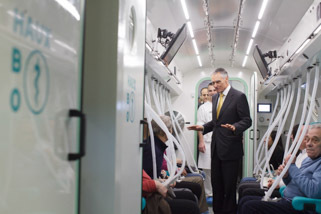
 |
|
As Portugal takes over the EU presidency, the country’s president, Professor Aníbal Cavaco Silva, stresses the need, among other things, for Europe to assert itself as an effective and influential global performer
The 50 years of the Treaty of Rome that we are now duly celebrating prove that European integration progressed whenever it was feasible to associate strategic vision, political determination and pragmatism. These were the ingredients with which the European utopia of its founder members became the astonishing reality that is today’s EU.
Europe is once again at a crossroads. It has to choose the right path for its aims to be reached: peace, security, prosperity. It is once again decisive to call upon the ingredients for success: strategic sense, resolute leadership and pragmatism in action. The Portuguese presidency of the EU thus occurs in a phase of crucial challenges for the future of Europe.
Reform must go ahead
Institutional reform should again be launched after the failure of the Constitutional Treaty. Essentially, this is the strengthening of democratic legitimacy and the effectiveness of EU institutions. Democratic legitimacy must not be based only on the states, but also on the citizens. Greater effectiveness and agility in the decision-making procedures cannot be postponed, in view of the recent enlargements and the need to assert Europe as an effective and influential global performer.
A new treaty cannot ignore new challenges such as energy and the environment. These will be the two new drivers of European integration. It is also expected that Europe will provide itself with a more cohesive and effective external policy. The world demands a strengthened European intervention in the international scene.
Another challenge concerns the European economy’s answer to the opportunities that globalisation offers. Greater mention has been made of threats than of opportunities, yet Europe has all the required conditions to take advantage of the vigorous dynamism of the global economy. For this reason it is necessary to overcome the defensive logic that still dominates some of the European resources.
The single market, single currency and enlargement provided the EU with a scale and a level of integration that are extraordinary bases to face globalisation. But more must be done. The EU must finalise the single market, specifically in the cases of energy and financial services. It must provide markets and regulation with the flexibility to guarantee competitiveness. The key word when I presided over the EU in 1992 was harmonisation; today it is flexibility. From scale to flexibility: this is the way that can and must be traversed, but without missing out on the social pattern and competition discipline that govern the EU.
The Lisbon Agenda must be relaunched to improve its effectiveness, promoting innovation and entrepreneurialism, encouraging economic and social reforms and streamlining the markets that suffer from heavy bureaucratic and regulatory constraints. The European Commission, presided over by my countryman, José Barroso, is also challenged on the issue of mobilising the member states for the objective of competitiveness.
Contributing towards the success of the Doha round of trade talks is another urgent task for the EU. A global economy simultaneously demands liberalisation and multilateral discipline. The EU must fight for an effective multilateralism to govern global economic relations.
The transatlantic agenda is another key issue. Transatlantic relations are a priority for the EU. A transatlantic partnership must be promoted in all respects and, in particular, with regard to the economy. The European and North American economies have much to gain from greater dialogue and regulatory convergence.
External relations
The Portuguese presidency will have a full agenda concerning external relations. The EU has a unique network of external relations that should be promoted. Its role as a global actor is irreplaceable.
Summits with Brazil, Russia, India and China will be held during the Portuguese presidency – a strong impetus will be given to links with those countries, which are now on the crest of the global economy wave. Portugal also intends to organise a second EUAfrica summit. The African continent has a particular geo-strategic importance for Europe and is an area of opportunity that cannot be ignored.
Portugal, in the presidency of the EU, will surely be an ‘honest broker’ to create convergence between the member states and defend Europe’s common interests.
Download here the PDF version of the article in The Banker (82 KB)
© 2006-2016 Presidency of the Portuguese Republic
You have gained access to the records of the Official Site of the Presidency of the Republic from 9 March 2006 to 9 March 2016.
The contents available here were entered in the site during the 10 year period covering the two mandates of President of the Republic Aníbal Cavaco Silva.